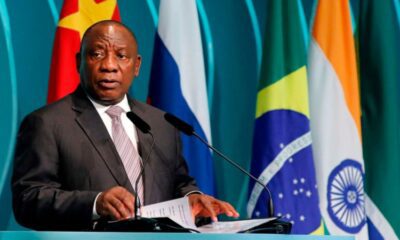Political Issues
Saraki, Change And the Question of Party Supremacy -By Adeolu Ademoyo

“He traded away a victory won with our sweat and blood/…Say, PDP in the morning, Labour at noon, APC at night/Wind-vane politicians with multiple tongues/…Say, Nigeria’s rulers stink like festering corpses/Their nuisance chokes the startled world/Honourless, truthless, with hearts of stone/In league, all times, with treacherous forces.” – Niyi Osundare, “Blues for the New Senate King”, Premium Times, June 29, 2015.
The process that led to the emergence of Dr. Abubakar Olubukola Saraki as Senate King is sufficient for any genuine advocate of change to give up on Nigeria, on introspection. However, Professor Niyi Osundare’s categorical poetic reflection on this major moral injury on the nation and the change movement on one hand, and the emergence of strange new forms of explanation of this treachery on the other hand require that we revisit the new explanation, exhaust the argument once and for all, and leave the rest to history and the conscience of each Nigerian.
The core of the new defence (or shall we call this explanation?) of Saraki and Dogara’s rebellion rests on what is said to be the limitation of party supremacy in a part and the “Tambuwal Effect” on another part. The “Tambuwal Effect” in contemporary Nigerian politics relates to how the present Governor of Sokoto state, Aminu Tambuwal, an erstwhile PDP member, became the speaker of the Seventh Nigerian House of Representatives, against the wish and anointed candidate of his then party, PDP.
At a purely formal and extremely positivistic level, these two arguments appear convincing, but that is only an appearance to one who fails to bring the purpose of a country and her people, historical and moral contexts, to the reading of Nigerian politics in the historic 2015 elections. Also the moral imperatives that Nigerian people deserve that would, once and for all, set the country on the path of an irreversible political, economic, social, technological and moral progress. When purpose, history and moral context are brought to bear on these arguments, they collapse because they fall short of the strength and conviction they initially appear to have to the uncritical and unwary mind.
There are two premises to the “argument from the weakness of party supremacy” that has been used to explain and rationalise Senate King Saraki’s emergence. One is that party supremacy works best where parties are ideologically based. Even when the arguer may not reach this conclusion, the logic of the premise of the argument is that since Nigerian parties are not ideologically based, Nigerian politicians are free to trade and prostitute their elections, regardless of the political and moral circumstances of the mandate.
The second premise of this new defence is that given the so-called “limitation of party supremacy”, constituency or caucus supremacy becomes the dominant driving factor. This premise strangely but wrongly assumes that legislative constituencies and caucuses are project driven and are not driven by party or ideology. So, on the strength of this premise, it is presumed that legislators will vote based on their constituency and caucus calculations, which are presumably not driven by ideology or party supremacy, and they will not vote on the basis of party supremacy. Again the logical consequence of the premise of the argument is that Nigerian legislators are free to and will trade and prostitute their elections, which originally were based on the party, and the moral and political advocacy that brought their party to government.
The second argument, which relies on the “Tambuwal Effect” in Nigerian politics, is pretty straightforward. It relies on the analogy between Tambuwal on one hand and Saraki and Dogara on the other hand. In other words, the reasoning is that if Aminu Tambuwal did it, what is wrong with the Senate King, Abubakar Olubukola Saraki and Speaker Dogara doing the same?
On the surface these appear to be strong arguments. However, they are weak under rational scrutiny. The argument that Nigerian parties are not ideologically driven and cannot impose party supremacy on decisions, and that therefore Nigerian politicians can and will trade their elections which they won under the party, hence Senate King’s Saraki’s emergence is explicable, goes too far by eliminating the critical ‘Change Factor’ that distinguished the APC from the PDP at the critical juncture of the 2015 Nigerian elections.
This elimination of the critical factor of change (which APC as a party represented for obvious and verifiable reasons during the election) in this argument is morally shocking because the question is: “why did we waste our time campaigning for change on the Change Train?” To now push the argument after the election of Mr. Buhari as president that “oh, you see Nigerian politicians will make loyalty to their constituencies superior to party supremacy, because Nigerian parties are not ideologically driven…” raises a serious moral spectre which is hunting the country, as I have argued.
This argument would have been morally credible if it were made before the election of Mr. Buhari. That way we will recognise that there is nothing called party supremacy and every Nigerian can go their different ways. The use of this argument about the “weakness of party supremacy” only after the election of Mr. Buhari – which was based on the party, its will and supremacy, is a cynical mockery of the collective aspiration of Nigerian people who stood by the advocacy of change during the election. This argument raises the bar to a morally horrific proportion of a radical moral problem that will permanently define the rest of the Buhari presidency and Nigeria after Buhari. This is because the questions that will always be asked are: Is party supremacy good to elect Buhari but not good in electing other officers of the Nigerian democratic institutions? If so, why? If not so, why did party supremacy suddenly become weakened and suddenly become an anathema immediately after the election of Mr. Buhari? Why is change fit only for the presidency and not for the other arm of state, the legislature? Given the prostituting history of Nigerian politicians, why will anyone think ordinary Nigerians would allow party supremacy in electing Buhari but will throw away such in electing other officers of the Nigerian state?
Something morally puzzling, which has given so many things away, is at stake. And this moral puzzle will define Nigeria for the next four years. This is what explains and gives strength to the view that Nigerian people were used and dumped in the emergence of Senate King Saraki and Speaker Yakubu Dogara and the continuous strange explanations of their emergence. Laid bare, this is the immorality that will hunt the Muhammadu Buhari presidency, the Senate Kingship of Abubakar Olubukola Saraki, the Speakership of Yakubu Dogara and the rest of the country for the next four years.
Let us take the second argument about the “Tambuwal Effect” and rest our case for posterity and leave things to the conscience of each Nigerian. The use of the “Tambuwal Effect” to explain the emergence of Senate King Saraki is a false analogy and cannot logically stand, given the logical qualities of the tool of reasoning called analogy, which this argument rests on. And here is it. In simple logic, an analogy is valid if the two sides of the analogy being compared are exactly the same, both in form and content. Yes Senate King Saraki and former speaker Tambuwal are the same in form but they are not the same in content. And that is the source of the moral revulsion against Senate King Saraki and this argument about the analogy of a “Tambuwal Effect”.
The difference in content between Saraki and Tambuwal lies in the change advocacy that swept Buhari and the new APC legislators to power. Historically, at no point did PDP stand for change. PDP stood for the status quo. So, it is morally credible for a former agent of the status quo like ex-speaker Aminu Tambuwal to align with change, but is morally incredible, perplexing and revolting for a purported ‘agent of change’ like Abubakar Olubukola Saraki to go back and align with the pro-status quo PDP. That is the difference that disqualifies the false analogy being drawn between Saraki and Tambuwal, and I challenge anyone on the point of rationality and reason to step out openly in the public sphere and contest my disqualification of this false analogy.
I am calling for serious arguments over this monumental treachery that will go down in Nigerian history and be properly documented for prosperity unlike the usual abusive or silly ethnic taunting. And such responders must lay bare for all to see the logical qualities of the analogy with a “Tambuwal Effect” to explain the emergence of the Senate King Saraki and Dogara. The advocates of change could be accused of naivety for allowing characters like Saraki and his nPDP group in their midst. The advocates of change and APC should have let the nPDP stay with PDP, and allow for them to be politically consumed, rather than defiling the APC, the wind of change and the electoral decision of the Nigerian people, who are advocates of change.
However, it is wrong to say that the advocates of change and APC cannot and should not hold on to the supremacy of party in the grim circumstances (caused by the PDP) of the last election, by insisting on the will of the party that made the change mission possible, while working with the Nigerian people.
That the change mission should be filled with moral and ideological content such that those who cannot reconcile themselves to the supremacy of this moral and ideological content – like members of the nPDP – should be made to leave and re-join their original party,PDP, is a legitimate but different argument.
Therefore, the factors of the purpose of a country and her people, history and moral context of the last election make the use of the arguments about the “weakness of party supremacy” and the “Tambuwal Effect” to explain and rationalise the emergence of Senate King Saraki and Speaker Dogara unhelpful, and justifies a major moral injury on the Nigerian people and voters who invested in the change movement, the change movement itself, its history, and the moral investments in the change mission by ordinary Nigerians, home and abroad.
Adeolu Ademoyo, aaa54@cornell.edu, is of the Africana Studies and Research Center, Cornell University, Ithaca, NY.





















